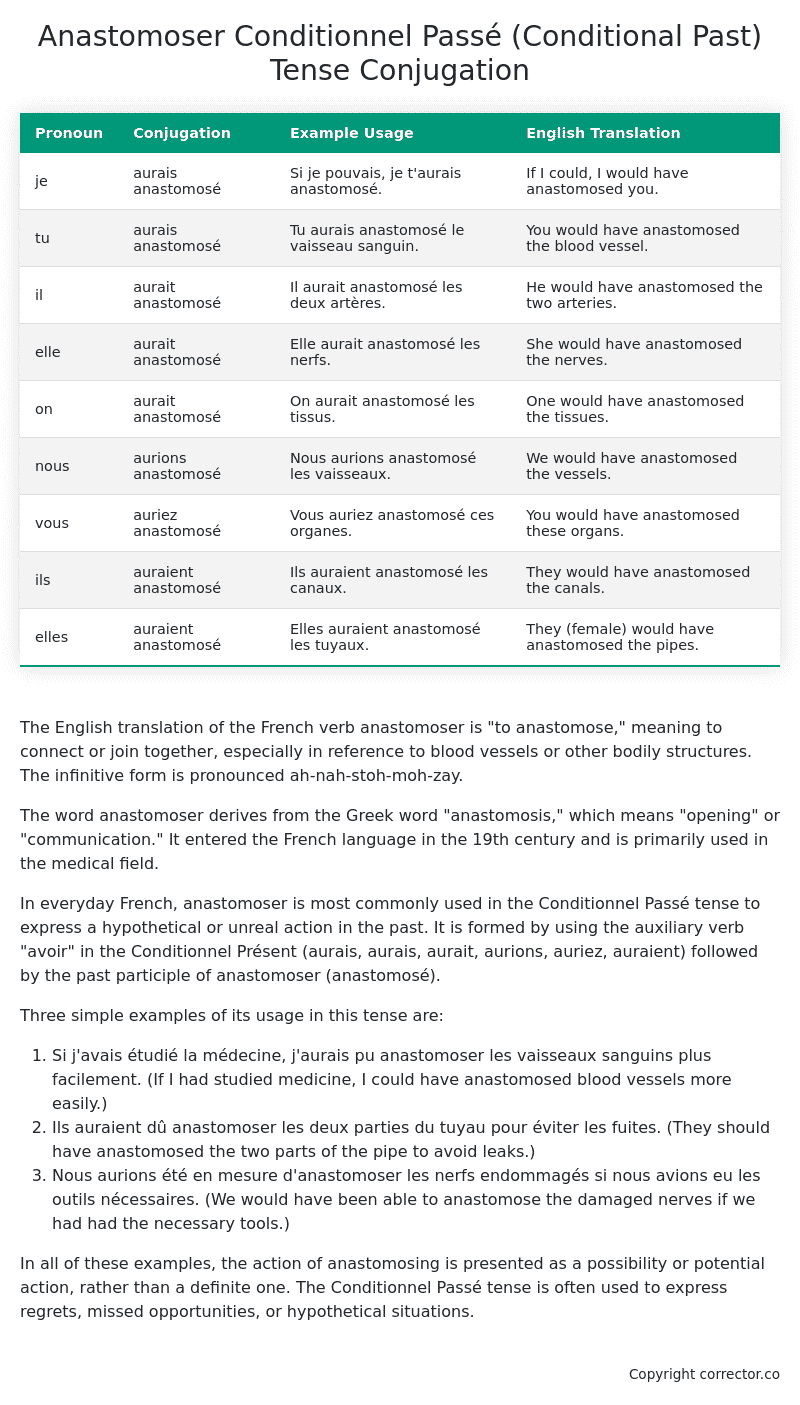Conditionnel Passé (Conditional Past) Tense Conjugation of the French Verb anastomoser
Introduction to the verb anastomoser
The English translation of the French verb anastomoser is “to anastomose,” meaning to connect or join together, especially in reference to blood vessels or other bodily structures. The infinitive form is pronounced ah-nah-stoh-moh-zay.
The word anastomoser derives from the Greek word “anastomosis,” which means “opening” or “communication.” It entered the French language in the 19th century and is primarily used in the medical field.
In everyday French, anastomoser is most commonly used in the Conditionnel Passé tense to express a hypothetical or unreal action in the past. It is formed by using the auxiliary verb “avoir” in the Conditionnel Présent (aurais, aurais, aurait, aurions, auriez, auraient) followed by the past participle of anastomoser (anastomosé).
Three simple examples of its usage in this tense are:
- Si j’avais étudié la médecine, j’aurais pu anastomoser les vaisseaux sanguins plus facilement. (If I had studied medicine, I could have anastomosed blood vessels more easily.)
- Ils auraient dû anastomoser les deux parties du tuyau pour éviter les fuites. (They should have anastomosed the two parts of the pipe to avoid leaks.)
- Nous aurions été en mesure d’anastomoser les nerfs endommagés si nous avions eu les outils nécessaires. (We would have been able to anastomose the damaged nerves if we had had the necessary tools.)
In all of these examples, the action of anastomosing is presented as a possibility or potential action, rather than a definite one. The Conditionnel Passé tense is often used to express regrets, missed opportunities, or hypothetical situations.
Table of the Conditionnel Passé (Conditional Past) Tense Conjugation of anastomoser
| Pronoun | Conjugation | Example Usage | English Translation |
|---|---|---|---|
| je | aurais anastomosé | Si je pouvais, je t’aurais anastomosé. | If I could, I would have anastomosed you. |
| tu | aurais anastomosé | Tu aurais anastomosé le vaisseau sanguin. | You would have anastomosed the blood vessel. |
| il | aurait anastomosé | Il aurait anastomosé les deux artères. | He would have anastomosed the two arteries. |
| elle | aurait anastomosé | Elle aurait anastomosé les nerfs. | She would have anastomosed the nerves. |
| on | aurait anastomosé | On aurait anastomosé les tissus. | One would have anastomosed the tissues. |
| nous | aurions anastomosé | Nous aurions anastomosé les vaisseaux. | We would have anastomosed the vessels. |
| vous | auriez anastomosé | Vous auriez anastomosé ces organes. | You would have anastomosed these organs. |
| ils | auraient anastomosé | Ils auraient anastomosé les canaux. | They would have anastomosed the canals. |
| elles | auraient anastomosé | Elles auraient anastomosé les tuyaux. | They (female) would have anastomosed the pipes. |
Other Conjugations for Anastomoser.
Le Present (Present Tense) Conjugation of the French Verb anastomoser
Imparfait (Imperfect) Tense Conjugation of the French Verb anastomoser
Passé Simple (Simple Past) Tense Conjugation of the French Verb anastomoser
Passé Composé (Present Perfect) Tense Conjugation of the French Verb anastomoser
Futur Simple (Simple Future) Tense Conjugation of the French Verb anastomoser
Futur Proche (Near Future) Tense Conjugation of the French Verb anastomoser
Plus-que-parfait (Pluperfect) Tense Conjugation of the French Verb anastomoser
Passé Antérieur (Past Anterior) Tense Conjugation of the French Verb anastomoser
Futur Antérieur (Future Anterior) Tense Conjugation of the French Verb anastomoser
Subjonctif Présent (Subjunctive Present) Tense Conjugation of the French Verb anastomoser
Subjonctif Passé (Subjunctive Past) Tense Conjugation of the French Verb anastomoser
Subjonctif Imparfait (Subjunctive Imperfect) Tense Conjugation of the French Verb anastomoser
Conditionnel Présent (Conditional Present) Tense Conjugation of the French Verb anastomoser
Conditionnel Passé (Conditional Past) Tense Conjugation of the French Verb anastomoser (this article)
L’impératif Présent (Imperative Present) Tense Conjugation of the French Verb anastomoser
L’infinitif Présent (Infinitive Present) Tense Conjugation of the French Verb anastomoser
Struggling with French verbs or the language in general? Why not use our free French Grammar Checker – no registration required!
Get a FREE Download Study Sheet of this Conjugation 🔥
Simply right click the image below, click “save image” and get your free reference for the anastomoser Conditionnel Passé tense conjugation!

Anastomoser – About the French Conditionnel Passé (Conditional Past) Tense
Formation
Common Everyday Usage Patterns
Expressing Unreal Past Scenarios
Polite Requests or Suggestions
Expressing Doubt or Uncertainty
Interactions with Other Tenses
Conditional Present
Indicative Past Tenses
Conditional Future
Summary
Want More?
I hope you enjoyed this article on the verb anastomoser. Still in a learning mood? Check out another TOTALLY random French verb conjugation!


